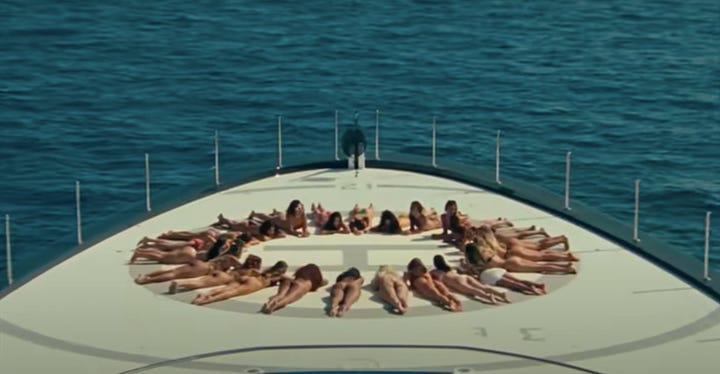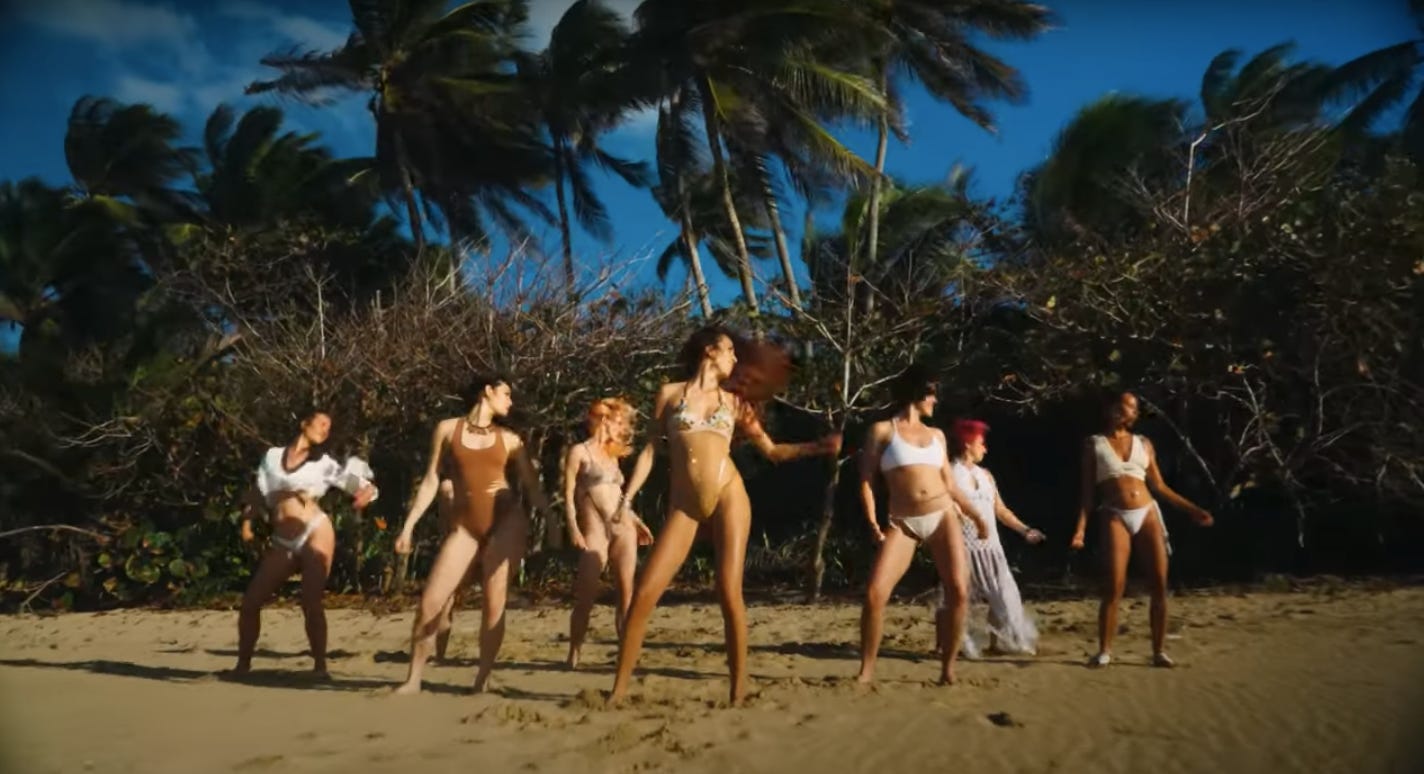This is a continuation of Pussy Power (part one).
Months after my first dance class with Alyssa on the beach, I found an invitation to her Pussy Empowered retreat in my inbox. I was stoked — I was also stunned. The theme was Video Vixen and would culminate in the filming of a video for Alyssa’s original song, “I Am Who I Am.”
Prioritize your own bliss
Shed the weight (you’re dismissed)
Time to strut in your truth
Damn right I’m living proof
Trust in your intuition
Dreams will come to fruition
I am who I am.
YESSS. This dream was coming to fruition way sooner than I expected.
In the email announcement, Alyssa shared her long-held aspiration of becoming a video vixen — the super sexy women featured in hip hop videos especially from the late 90s and early 2000s.
“She strutted out of the sea with water dripping down her body, she oozed sensuality shamelessly, she emanated confidence and radiance in breathtaking locations,” Alyssa wrote. She had yearned to be a part of this seemingly glamorous life of sexual liberation and travel since her childhood days flipping between MTV and VH1 at her grandparents’ house after (catholic) school.

Meanwhile, at my household, music videos were strictly banned. My mom was the type to pick her 5-year-old up from a birthday party early when she found out the kids were going to watch an “inappropriate” movie like Men in Black. Most Disney movies were a no-go (she despised the princess trope) and even as we got older, Disney Channel was off limits. “I didn’t like how the female characters were portrayed,” my mom said when I asked her about it recently. “It was all stereotypes.”
And if Disney Channel was bad, MTV was like the most profane, made-for-men porn that existed. She felt music videos, especially, depicted women as submissive, objectified us.
… But I don’t remember her explaining that at the time. I remember her using the word “inappropriate” a lot. I sensed judgement towards the women in the videos for being “provocative” or “promiscuous” — she didn’t want me to look to them as role models.
And I thought she was naïve.
I was like, mom, this is the way the world works: men want women who are super sexy (thin, flawless skin that’s golden but not too dark, curves in only the right places) and perform for them. And being wanted by a man is really important… I’m pretty sure it’s actually the thing that makes you matter in the world.
Music videos or not, I was getting the message loud and clear.
These days, I appreciate my mom’s efforts to protect me. And I also see that the censorship — and lack of empowering messages to replace the disempowering ones — added to a sense of confusion and repression of my sexuality.
Because the banning was also rooted in the unconscious trauma the explicit sexual content brought up for my mom. She was raised by a mother who had endured recurrent sexual abuse and passed on the fear and shame she had internalized. I was raised by a mother who carried that legacy, plus the impacts of her own experiences of violence. For so long it has not been safe — and still isn’t in many circumstances — to express our sexuality. Generations of abuse that has gone unhealed plus continued violence perpetuates the fear.
I wonder how different things would have been if my mom and I had been able to have a nuanced conversation back then. If the music videos weren’t banned, but exposed (inevitable anyway) with an educated, critical lens. If I’d had more images/examples of empowered women doing their own art on their terms. If I could have see what deeply consensual, joyful sexual connection looked like.
And most importantly, if I’d been taught to listen to my own body, develop my own source of guidance that would make me impermeable to any bullshit messaging and help me stay grounded and strong in myself.
All these years later, Alyssa’s retreat brought me the perfect opportunity.
My first question: what did the forbidden Video Vixen have to teach me?
Alyssa gave us tons of resources to explore the topic. (I especially love this explainer on the rise and fall of the early 2000s video vixen). And as I dove in, I found a world of paradoxes. Some of these women felt empowered on camera, were Well Paid, and launched acting careers from these roles. It was part of a movement of women capitalizing on their own bodies — taking back their agency in a system where our bodies are constantly capitalized on by others.
As Chanelle Gallant puts it in her essay, Fuck You, Pay Me (which is focused on sex work, but I think many of her points can be applied more broadly):
Being pretty, pleasing, smiling, flattering and flirting with customers is an unspoken requirement of the job — for women. Wherever we work, women are sexualized and, for the most part not paid an extra dime for it… Check out the dress codes for waitresses, nurses, airline stewards… crafted according to aesthetics that please elite white men. We might not understand the value of our sexuality, but capitalism sure as hell does.
The pleasure of sex work is in the power to take control over our work, our bodies, and what the world tells us they are worth.*
*You can read the essay in adrienne maree brown’s book, Pleasure Activism: The Politics of Feeling Good.
Many of the video vixens understood the value — their sex appeal was making these videos, and they deserved top dollar for it.
In Alyssa’s podcast episode on the subject, she reminded me that expressing our sexuality itself has never been the problem. It’s the context — the power dynamics embedded in the patriarchy — that limit women’s agency, that create a situation where we’re in some cases abused and devalued trying to survive in the system (and punished for revealing our experiences), and in others, paid well and provided with career-launching experiences (and then get slut-shamed for capitalizing on our own desirability in the context of the male gaze).
… which brings me to the videos themselves, mostly dreamed up and directed by men for songs written by men, created to sell to a culture that’s been steeped in what men find attractive. In many of them, the women as whole humans don’t get to be part of the art. To me, they’re portrayed more like one-dimensional props — bodies in service to the male artists. Which is so often where our erotic energy is imprisoned.




As Audre Lorde writes in Uses of the Erotic: The Erotic as Power,
“We have been warned against it [erotic energy] all our lives by the male world, which values this depth of feeling enough to keep women around in order to exercise it in the service of men… so women are maintained at a distant/inferior position to be psychically milked, much the same way ants maintain colonies of aphids to provide a life-giving substance for their masters.”
… mic drop.
And though so much has changed since she wrote those words in 1978, and since the golden era of late-90s/early-2000s hip hop music videos… so little has changed.
Sitting around the pool early in the retreat, Alyssa asked us how we were feeling about the video shoot. I shared that, for me, it was a dream becoming manifest — and that, actually, it was so much better than my original vision: to dance in a Bad Bunny music video.
I had recently watched his video for Monaco and was left feeling… frustrated. The shots of ~30 women on a yacht giving massages and being doused with champagne while Bad Bunny sings,
Ustedes no saben lo que es estar en altamar con dosciento’ cuero'
(You don't know what it's like to be on the high seas with two hundred hoes)
Que la azafata te mame el bicho en el cielo
(To have the stewardess suck your dick in the sky)




AY DIOS.
The yachts
Women’s asses in men’s faces on yachts,
Bodies displayed on decks of yachts
The expensive cars,
Women caressing expensive cars
Tonguing spaghetti in expensive cars…
Men flaunting cars and boats and an endless supply of women as pleasing accessories — part of the collection of toys that prove these men’s wealth. Same shit, different decade.
Like my mom 20 years ago, ME CANSA.
Again, it’s not the expression that’s the problem; nor that these women are looking hot and getting paid (as long as they were treated with the utmost respect on the job).
It’s the system, the male-dominated industry that relentlessly churns out this stale, shallow imagery that pisses me off. That the male gaze has been so inescapable for so long that many of us women don’t realize that we haven’t been in control of our own narratives about our bodies and how we feel good in them. That even still, it’s mostly men writing the soundtrack to our lives.
According to this 2023 UPenn/Spotify study of 1,100 popular songs released between 2012-2022, LESS THAN ONE PERCENT were written by only women writers.
And during those same years, only about 14% of all nominees for the Grammy’s major categories were women.
In 2022, just 3.4% of producers were women.
Of 1,756 producing credits, 13 went to women of color (barely more than half a percent)
It’s fucked.
So I’ll go shake my empowered ass elsewhere, thank you.

We walked a path to a quiet stretch of beach near the retreat house, Alyssa toting our giant speaker. After grounding ourselves on the sand and sharing intentions for our time together, we stood up and faced the ocean, stretching and swaying. As the sun went down, we cranked up the music, dancing in surf to Tokisha, Amaarae and Sampa the Great.
We got low in the sand, took off our tops and flashed the waves, knelt and let the salty water crash over our thighs. “Okay let your hips lead!” Alyssa yelled, encouraging us to tune into this place of power and let them run the show.
“Okay now your pussy! How does your pussy want you to move?!”
It’s not something we’re taught: to deeply listen to what our body wants for us and act accordingly. I could sense the magic of a reframe happening: What does it feel like to tap into how I feel sexy — and then be that sexy, just for me?
Stay tuned for part three: the ongoing process of extricating my eroticism from the male gaze… and embracing membership in the itty bitty titty committee :)






It’s such a gift to witness these reflections and work through these reframes and reclamations together. Thank you for being a part of this experience and keeping the conversation alive. What an ongoing and worthwhile process of coming home to ourselves ♥️🌹